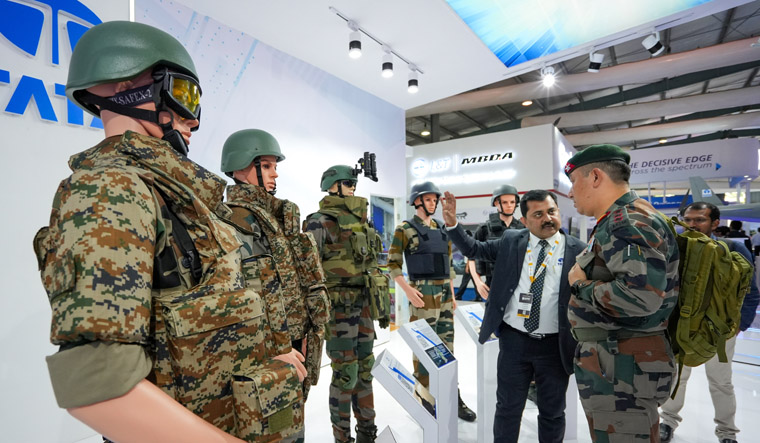In a fulsome fillip to India’s mega Africa Outreach plan, 50 African countries—including 20 defence ministers, seven CDS and service chiefs, and eight permanent secretaries—took part in parleys with India’s defence minister Rajnath Singh on Tuesday on the sidelines of DefExpo—India’s biennial military production showcase event being held in Gandhinagar.
India’s defence minister expressed his commitment “to explore new areas of convergence for defence engagements, including capacity building, training, cyber security, maritime security and counter-terrorism.” The commitment was suitably encapsulated in the ‘Gandhinagar Declaration.’
India’s Africa Outreach effort focused on wooing Africa with promises of military equipment sale, joint exercises and training focusing on traditionally warm historical ties and commonalities, even as an effort to wean them away from China—without the Asian giant being named—continued.
The China focus was obvious when Singh said, “India and Africa are important stakeholders in ensuring a safe and secure maritime environment, especially in Indian Ocean Region.” He also conveyed India’s commitment to “strengthening capabilities in combating terrorism and extremism, supporting UN peacekeeping missions and work for open and free oceans.”
“Free and safe maritime environment” and “open and free oceans” are terms regularly used by the US-led West to slam China’s aggressive posturing on the seas by an increasingly powerful and assertive Chinese Navy.
The Indian effort seek to counter and circumvent China’s strategy of establishing a network of Chinese military and business establishments in the entire swath, stretching from western Africa in the west to the Chinese mainland in the east, often referred to as the ‘String of Pearls’ strategy.
It is believed that the ‘String of Pearls’ would result in India’s encirclement by China’s ‘Spheres of influence.’
Besides a bid to establish itself as the main power in this side of the world, China’s strategy has to be seen in the light of its ‘Malacca Dilemma’ or the unavoidable route that Chinese ships have to take through the narrow Malacca Straits, which has the potential of being a ‘choking point’ for Chinese ships in times of hostility.
The Indian defence minister then made a sales pitch to the African nations for Indian-made military systems. “We have created a robust public and private defence industry. A defence manufacturing ecosystem has been created in India which has the advantage of abundant technical manpower. Our defence industry can work with you to fulfil your defence requirements.”
Seeking African support for India’s aim to be a permanent UN Security Council member, the minister said, “UN Security Council needs to be more representative for a sustaining global order, wherein, international peace, security and order are respected universally.”
Demographically, more than 17% of humanity comprises Indians.
Being held on the sidelines of the DefExpo, the India-Africa Defence Dialogue (IADD) is themed ‘India-Africa: Adopting Strategy for Synergising and Strengthening Defence and Security Cooperation.’




